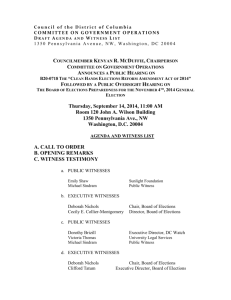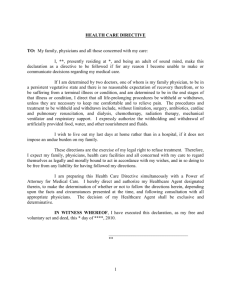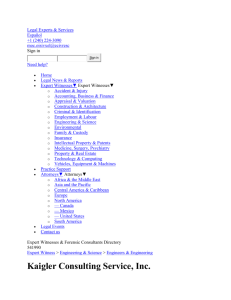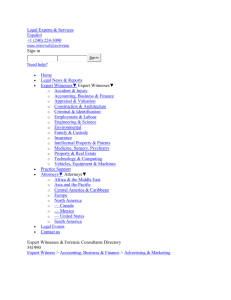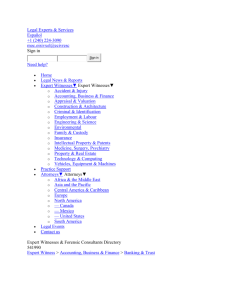LAWS13010 Evidence and Proof - Carpe Diem
advertisement
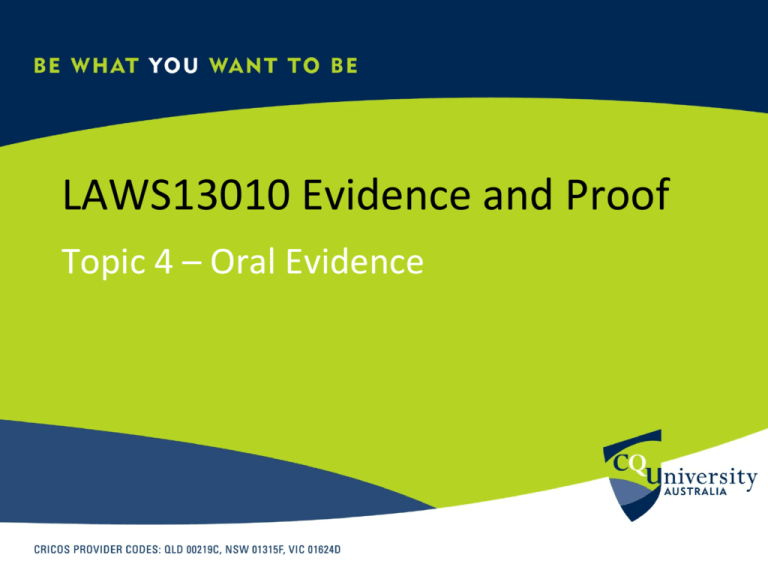
LAWS13010 Evidence and Proof Topic 4 – Oral Evidence Learning Objectives At the end of this topic, you should be able to: • Discuss the nature of oral evidence, and the rules which exist to ensure witnesses strive to give their best evidence; • Discuss the limitations of oral evidence, as a result of the limits of perception, comprehension, memory and honesty; • Discuss whether oral evidence gives inherent advantages to certain types of witness; • Discuss the protections available for certain vulnerable witnesses; and • Discuss the forms of privilege which may protect witnesses from answering certain types of question. What is Oral Evidence? For our purposes, oral evidence has four key characteristics: Oral evidence is viva voce: by voice, using interview techniques, not monologues. Oral evidence is given under an oath or affirmation to be truthful – backed by penalties. Oral evidence ideally relates to things perceived by the witness with their own five senses. Oral witnesses may be questioned by all parties. Oaths, Perjury and Contempt The evidence which I shall give to the court and jury sworn between our Sovereign Lady the Queen and the defendant shall be the truth the whole truth and nothing but the truth, so help me God Oaths Act 1867 (Qld) s25 Before giving oral evidence, a witness must swear or affirm that their evidence will be truthful. The crime of perjury – lying before a court – can result in jail terms of 14 years, and life in some circumstances Criminal Code 1899 (Qld) s.124 A witness must answer all proper questions put to them. A failure to do so may result in the witness being imprisoned for 7 days or until they answer. Justice Act 1886 (Qld), s.82 Evidence in camera A fundamental principle of open justice is that oral evidence should be given in an open court. However this principle is limited in three ways. First, some statutes may require proceedings to be conducted in private. Childrens Court Act 1992 (Qld) s.20 Second, a court has an inherent power to conduct proceedings in private if this is necessary in order to do justice. Hogan v Hinch Third, the inherent power has been given statutory form in relation to criminal matters in Queensland. Justices Act 1886 (Qld) s.71 The Limits of Perception Compared to scientific instruments, human beings have very limited perception. Oral evidence can be no more accurate than the perceptions of the witnesses. In addition, human beings “filter” their perceptions. Different witnesses, observing the same event, are likely to have different recollections. The Limits of Comprehension How often do you ever just simply observe something without interpreting it or trying to understand it? Imagine two people looking at an item of stolen property – an antique vase. One witness has a passion for antiques; the other witness has a passion for swimming. Do they see the same things? Look at the girl in the picture to the right. She is clearly crying, but is she sad or is she joyful? Might two witnesses validly reach the opposite conclusions? The Limits of Memory Brains are weird. Human memory has a number of significant failings: ~ Not everything gets “recorded” in memory ~ Memories degrade over time, and the brain sometimes “fills in the blanks” ~ Memories are suggestible. People may “remember” things they never saw. theinnocenceproject.org suggests that in about 75 percent of DNA-based acquittals after DNA evidence became available, the DNA evidence was contrary to compelling witness accounts Refreshing Memory If a witness is unable to remember matters upon which they are questioned, they may ask to refresh their memory from documentary sources. The documentary source must have been made “contemporaneously” - at or near the time of the incident. R v Richardson [1971] 2 All ER 773 The document must then be shown to the other side, and the witness may be questioned in relation to its contents. The Uniform Evidence Acts also contain provisions to allow police to give evidence in chief by being “led through” a statement made and signed at the time of the incident. Evidence Act 1995 (Cth) s.33 The Limits of Honesty Despite oaths to the contrary, some witnesses will simply lie. However even witnesses who are endeavouring to assist the court may tell less malicious forms of lie, for instance: ~ Recasting facts or circumstances to put themselves in the best possible light; ~ Omitting or “forgetting” details they may consider embarrassing; ~ Consciously “filling in the blanks” to provide a more coherent account of events. The Limits of Eloquence Testimony is inherently an oral activity, so the capacity to give effective testimony is affected by the eloquence of the witness. Does this reduce the effectiveness of those with communication difficulties, such as non-English native speakers, or those with communication-related disabilities? Are certain “types” of witness more or less likely to be believed, as a result of stereotyping and discrimination? Are certain types of witness – particularly the vulnerable – likely to attract a protective instinct from jurors? Children as Witnesses Principles for dealing with children as witnesses (a) the child is to be treated with dignity, respect and compassion; (b) measures should be taken to limit, to the greatest practical extent, the distress or trauma suffered by the child when giving evidence; (c) the child should not be intimidated in cross-examination; (d) the proceeding should be resolved as quickly as possible. Evidence Act 1977 (Qld) s.9E Children as Witnesses: Practice Methods used to protect child witnesses (a) children may give tape-recorded evidence prior to the trial; (b) children may give evidence by an audio-visual link; (c) children may give evidence from behind a screen, particularly to protect them from the influence of the accused; (d) cross-examination is limited. No “fishing expeditions”. Evidence Act 1977 (Qld) pt 2, Div 4A Rape Victims as Witnesses The Criminal Law (Sexual Offences) Act 1978 (Qld) recognises the particular challenges faced by rape victims in giving evidence against the people accused of those offences. The public may be excluded from proceedings where such a witness is giving evidence, and their identity may be protected (s.5) A witness in a rape case may not be questioned about their sexual reputation for chastity or promiscuity (s.4). This rule prevents any possible inference that a voluntarily promiscuous person is more likely to have consented. Such rules are now commonly referred to as “rape shield” rules. Privilege: Self-incrimination [A] party cannot be compelled to discover that which, if answered, would tend to subject him to any punishment, penalty, forfeiture or ecclesiastical censure. Bowen LJ, Redfern v Redfern (1891) P 139 (CA) Nothing in this Act shall render any person compellable to answer any question tending to incriminate the person. Evidence Act 1977 (Qld) s.10 However in criminal trials, the defendant is not compellable. If the defendant chooses to give evidence, they must obviously expect to be asked questions about whether they committed the offence. see Evidence Act 1977 (Qld) s.15 Privilege: Client Legal Privilege Protects the client, not the lawyer. A lawyer has a privilege not to answer questions in evidence if doing so would breach the client's confidence. Legal Profession Act 2007 (Qld) s.491 Four elements must be met. The material must be: • Communications • between the Client and Lawyer • for the dominant purpose • of obtaining legal advice relating to current or anticipated litigation. ESSO v FCT (1999) 201 CLR 49 Privilege: Various Public Interests Statements made before the Parliament or one of its committees cannot be questioned in any court. Parliament of Queensland Act 2001 (Qld) s.8 Evidence given in court cannot become the basis for an action in defamation. Defamation Act 2005 (Qld) s.27 Evidence may be privileged if its release would be injurious to the public . Duncan v Cammell Laird & Co [1942] AC 624 ... the freedom of speech and debates or proceedings in Parliament ought not to be impeached or questioned in any court or place out of Parliament. Bill of Rights 1688 Should Privilege be Wider? Religious communications between clergy and penitents are protected under the Uniform Evidence Acts, but not in Qld law. Evidence Act 1995 (Cth)s.127 Journalists are entitled to protect the identity of their sources under the Uniform Evidence Acts, but not in Qld law. Evidence Act 1995 (Cth) Div. 1A business, Should a cultural privilege exist? Consider the claims that the Hindmarsh Island Bridge should not have been built for cultural reasons which, as secret women's could not be disclosed. Chapman v Luminus (No. 5) (2001) FCA 1106 Review In this topic, you have learned: • The nature of oral evidence; • The importance of the oaths and perjury laws which support truthful honest evidence; • The limitations of perception, comprehension, memory, honesty and eloquence, and their implications for testimony; • The special arrangements for oral evidence by children and rape victims; • The range of privileges available; particularly against self incrimination; client legal privilege; and various public interest privileges.
